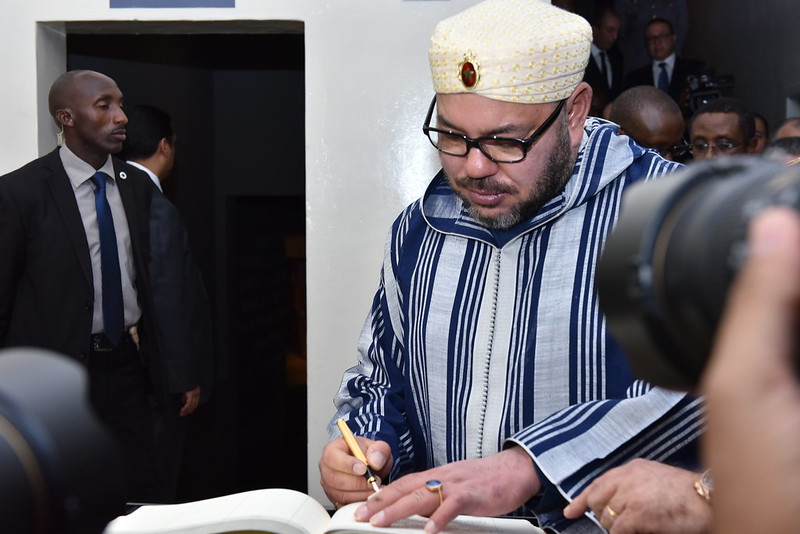King Mohammed VI of Morocco has pardoned over 4,800 cannabis cultivators in the Rif region to help support their integration into the cannabis market that was legalized in 2021 for therapeutic purposes. The pardon aims to combat illegal drug trafficking, boost the legal cannabis industry, and economically uplift the Rif region where cannabis cultivation has been a long-standing practice.
King Mohammed VI Pardons Nearly 5,000 Moroccan Cannabis Cultivators


A new chapter unfolds for cannabis producers in Morocco’s Rif region. On the occasion of a national holiday, King Mohammed VI has decided to pardon more than 4,800 farmers who were either under prosecution or had been convicted in cases related to the illegal cultivation of cannabis, the Ministry of Justice announced on Monday evening.
For more news like this, along with all the latest in legalization, research, and lifestyle, download our free cannabis news app.
King “Graciously Pardons” 4,831 People
The monarch King Mohammed VI “graciously pardoned 4,831 people who were convicted, prosecuted, or sought in cases related to cannabis cultivation,” the ministry stated in a press release.
The purpose of this royal pardon is to allow “the beneficiaries to integrate into the new strategy” launched after the partial legalization of cannabis production for therapeutic purposes.
Morocco, the world’s largest producer of cannabis according to the United Nations, passed a law in 2021 regulating the industrial and medical uses of cannabis, allowing its cultivation and exploitation in three impoverished rural provinces in the Rif region in the Northeast.
Opening Up the Rif Region
The kingdom aims to combat drug trafficking, position itself in the global legal cannabis market, and economically uplift the Rif region, where the plant has been cultivated for centuries. In 2019, between 80,000 and 120,000 families were estimated to be dependent on cannabis cultivation, according to official estimates. The pardons only apply to cultivators, whose illegal activities were often tolerated but could still lead to prosecution.
“This is an exceptional initiative that will allow these farmers and their families to live in peace and security and participate in the new legalization dynamic,” commented the director of the National Agency for the Regulation of Cannabis Activities (ANRAC) to AFP. For him, “it is also an important step towards the gradual elimination of illegal cultivation through legalization or the introduction of alternative crops.”
ANRAC was created to structure the legal sector through “the industrialization, transformation, export of cannabis, and the import of its products for medical, pharmaceutical, and industrial purposes,” the Ministry of Justice recalled.
The agency has already issued more than 200 permits to industrial players for processing, seed importation, and exportation.
King Praised for a “Historic Turning Point”
In an interview with the online newspaper Hespress, which is close to the royal palace, Chakib Al Khayari, the coordinator of the Moroccan Collective for the Medical and Industrial Use of Kif, praised the King for this “historic turning point” that “paves the way for sustainable socio-economic growth with impacts extending beyond national borders,” particularly in Europe.
In early July, the kingdom exported legally produced cannabis for the first time, destined for Switzerland.
—
(Featured image by Kigali Genocide Memorial (CC BY-ND 2.0) via Flickr)
DISCLAIMER: This article was written by a third-party contributor and does not reflect the opinion of Hemp.im, its management, staff, or its associates. Please review our disclaimer for more information.
This article may include forward-looking statements. These forward-looking statements generally are identified by the words “believe,” “project,” “estimate,” “become,” “plan,” “will,” and similar expressions. These forward-looking statements involve known and unknown risks as well as uncertainties, including those discussed in the following cautionary statements and elsewhere in this article and on this site. Although the company may believe that its expectations are based on reasonable assumptions, the actual results that the company may achieve may differ materially from any forward-looking statements, which reflect the opinions of the management of the company only as of the date hereof. Additionally, please make sure to read these important disclosures.
First published in Liberation, a third-party contributor translated and adapted the article from the original. In case of discrepancy, the original will prevail.
Although we made reasonable efforts to provide accurate translations, some parts may be incorrect. Hemp.im assumes no responsibility for errors, omissions or ambiguities in the translations provided on this website. Any person or entity relying on translated content does so at their own risk. Hemp.im is not responsible for losses caused by such reliance on the accuracy or reliability of translated information. If you wish to report an error or inaccuracy in the translation, we encourage you to contact us.



Comments are closed for this post.